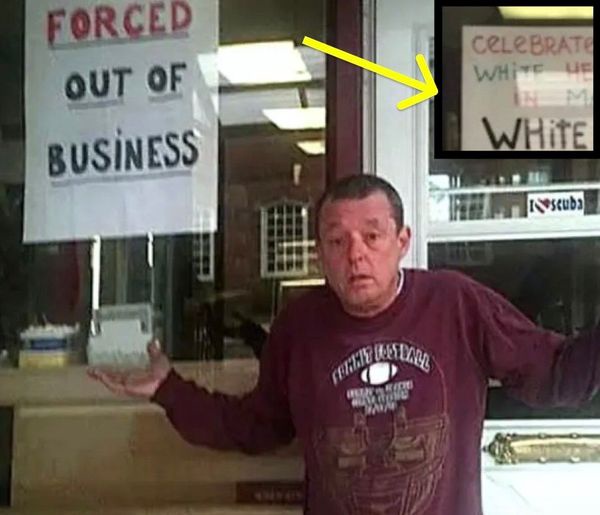Note: we are republishing this story which originally made the news in April 2015.
In a small town like Flemington, New Jersey, deli owner Jim Boggess was looking for a way to celebrate his heritage while fostering community spirit. Running his business on Main Street, Boggess believed he had found the perfect idea to express pride in his background. What he didn’t anticipate, however, was the backlash that would follow. His handwritten sign, placed prominently in the deli’s window, read: “CELEBRATE YOUR WHITE HERITAGE IN MARCH, WHITE HISTORY MONTH.”

Boggess likely hoped the sign would be met with appreciation or curiosity, but its reception turned out to be anything but positive. One customer, Bhakti Curtis, who is of mixed-race heritage, took particular offense. Curtis found the sign deeply troubling, stating that it appeared to mock Black History Month. He also pointed out that the “T” in the word “WHITE” was crossed in a style reminiscent of symbols associated with the Ku Klux Klan. Angered by what he saw as an offensive display, Curtis filed a complaint with the Flemington Police Department.
Despite Curtis’s grievances, the police concluded that the sign was neither racist nor explicitly derogatory. However, public perception of the sign told a different story. The local uproar around the deli and its owner intensified, creating a heated debate about race, pride, and intent. Social media and local conversations quickly amplified the controversy, and even though Boggess removed the sign after four days, the damage to his business was already done.
The fallout was swift and severe. Long-time customers stopped patronizing the deli, and the financial strain began to take its toll. While Boggess made an effort to reconcile with Curtis—going so far as to take a photo with him shaking hands—the gesture wasn’t enough to repair the deli’s tarnished reputation. Just a month after putting up the sign, Boggess was forced to close his business permanently.
Facing financial ruin, Boggess turned to the public for help. He launched a GoFundMe campaign with the title “Jimbos white history sign gone bad,” hoping to garner support from those who sympathized with his intentions. In the campaign’s description, Boggess expressed his frustrations and shared his perspective on the situation. He stated:
“If you haven’t heard of this story and you want to read about it, just google Flemington white history or go on YouTube and search White History Month. Anyway, it went crazy for four days and then I had to take the sign down for various reasons. It was only supposed to be a white thing, but people read more into it than that.
I don’t think I deserve this just because I wanted to be proud of being white and be able to celebrate my heritage like everyone else does. If you read this, please leave a comment and what state you’re from so I can see where my support is coming from.
Thank you for all the support and I WILL stay strong and hope to find a job.
Thank you,
Jimbo Boggess.”
Despite his plea, the community’s response remained mixed. Some individuals from across the country reached out to show their support, sending letters and comments backing Boggess’s sentiment. Yet, the local reality was far less forgiving. The controversy surrounding the sign had alienated too many customers, making it impossible for the deli to recover. The business that had once been a symbol of Boggess’s American dream became a casualty of public outrage.
This story, originally reported in April 2015, continues to raise questions about the intersection of free expression and social responsibility. Was Boggess’s intent misunderstood, or did he fail to grasp the broader implications of his actions? For some, the incident highlights the fine line between celebrating one’s heritage and inadvertently offending others. For others, it underscores the power of public opinion in shaping the fate of small businesses.
Boggess’s experience serves as a cautionary tale about the potential consequences of actions that, even if well-intentioned, can be perceived as offensive. It also reflects the complexities of discussing race and heritage in a diverse society. While some may have supported his right to celebrate his background, the broader reaction demonstrated the need for sensitivity in how such messages are conveyed.
In the end, Jim Boggess lost more than just his deli; he lost his vision of owning a business that brought people together. His story remains a poignant reminder of how quickly public perception can shift and the impact it can have on those caught in the spotlight.





